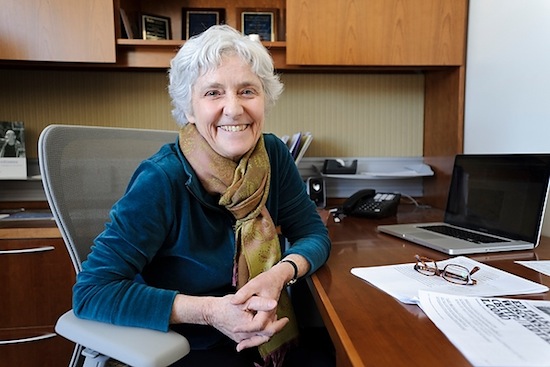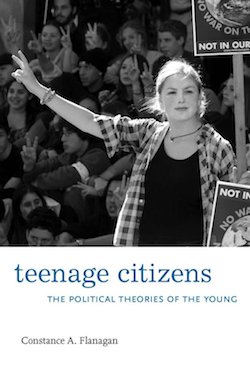New book examines young people’s overlooked views on politics

Constance Flanagan says while young people may not say they’re interested in politics, it’s more that they don’t identify with the word “politics.”
Photo: Jeff Miller
They’re too young to vote but not too young to care.
That’s part of the message in “Teenage Citizens: The Political Theories of the Young,” a new book by Constance Flanagan.
Flanagan, a professor in the Department of Interdisciplinary Studies at the School of Human Ecology, has long been interested in the political attitudes of young people and what shapes their ideas. The book uses Flanagan’s 25 years of research to show how teens’ personal and family values align with their political views.
“Every day, kids learn what it’s like to be part of the body politic,” Flanagan says. “It’s just not thought of in that way.”
Far too often, young people aren’t asked to share their views on such things as the rights and responsibilities of citizens or the root causes of poverty, Flanagan says.

Flanagan was raised in a socially conscious family where discussions of ideas were encouraged. You could say she’s been researching the attitudes of young people all of her life — she’s the oldest of eight children.
She completed her Ph.D. in developmental psychology in 1987 at the University of Michigan. She was a professor of youth civic development at Penn State University, where she co-directed the inter-college minor in civic and community engagement. She joined UW–Madison’s Department of Interdisciplinary Studies in the School of Human Ecology in the fall of 2010, and teaches courses in the area of civil society and community leadership.
Her book includes surveys from five studies of preteens to 19-year-olds in public schools, asking them about their beliefs and opinions. Questions explored issues like ethnic identity and what it means to be an American, the purpose of laws, the causes of inequality, the meaning of democracy, trust in others and community service.
While young people may not say they’re interested in politics, it’s more that they don’t identify with the word “politics,” Flanagan says. They’re greatly concerned about issues such as the environment, fairness, bullying and community.
They also see politics in action on a daily basis as members of schools and community-based organizations.
“People think of politics in too narrow of a way, as if it could be reduced to the work of elected officials. But politics has to do with how we exercise power and allocate resources,” Flanagan says. “It has to do with the kind of society we want. A big part of the book is trying to bridge political science and developmental psychology.”
One of her most significant findings was that young people’s political views are shaped very early in life. And a lot of their beliefs come directly from family.
When families emphasize social responsibility for people in need and for the common good, teens’ ideas about democracy focus on the principles of tolerance, social inclusion and equality, Flanagan says. When families place less emphasis on social responsibility, teens’ ideas about democracy focus on their own individual rights versus those of others.
While they may be too young to vote, Flanagan says it’s important that we pay attention to what young people think — and encourage them to be involved in the world around them.
In her research, young people were asked what democracy meant to them. Among the answers, which she reported verbatim:
“Being able to have my part in a gov’t that is often ruled by one group of people, my vote — my opinion — my choice — my country.”
“All people are treated fairly no matter what surcomstance (sic) or background. People choose how the government is to be run.”
“To me democracy means that people decide and I like that because unlike a monarchy the leader of our country is not passed down by a family who gets to choose who would be the best for our country.”
“Freedom of speech, freedom of choice, and just about every one can have some kind of rights.”
“Democracy is a form of govt where everybody has a say in the govt and ‘to be American’ means ‘I have freedom and know I’m just as good as anybody else.’”
“I felt good about giving them a voice,” Flanagan says. “It’s important that we turn and ask their opinions.”
The rise of social media has shown that young people aren’t using things like Facebook and Twitter merely to socialize but to share their ideas and create change.
“There are these other outlets that let you reveal aspects of your life that you couldn’t have before,” Flanagan says. “It’s becoming the norm.”
Her book has received reviews praising Flanagan for taking on a subject that is often overlooked.
“’Teenage Citizens’ is the most ambitious and original contribution to political socialization in years,” says Peter Levine, the Lincoln Filene Professor of Citizenship & Public Affairs at Tufts University. “In its rich depictions of adolescents from several decades, countries and socioeconomic backgrounds, it is an important contribution to political science, psychology and policy.”
While they may be too young to vote, Flanagan says it’s important that we pay attention to what young people think — and encourage them to be involved in the world around them.
“We shouldn’t underestimate the fact that they’re learning anyway and we should be conscious of what we’re teaching them,” Flanagan says. “It’s our job to help them understand.”




